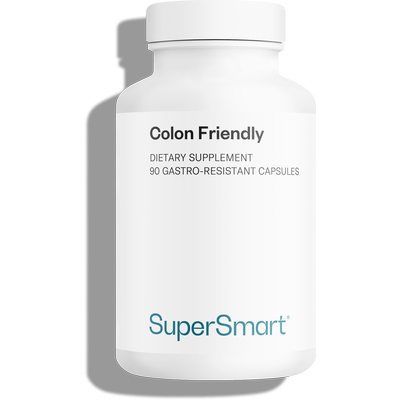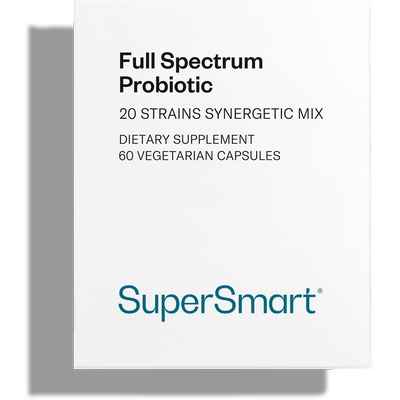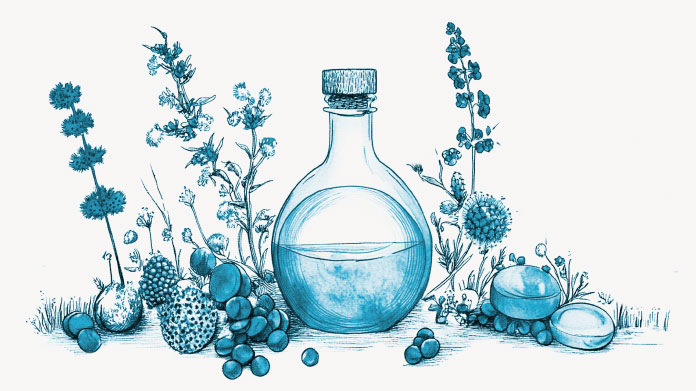What’s the best probiotic to take for a bloated stomach?
Though usually harmless, a swollen stomach is still a source of major discomfort. Discover the best habits to adopt and probiotics to take to permanently restore a flat tummy.

Swollen stomach: what are the potential causes?
A swollen stomach is the result of distension of the abdominal area, sometimes painful, often described as a ‘tight belly’. It’s a condition that’s particularly common but is fortunately not serious in the majority of cases.
Abdominal swelling is most often the result of an accumulation of gas in the small intestine: it’s referred to as bloating or meteorism (1).
This digestive disorder may be caused by swallowing too much air (aerophagia), or intestinal overproduction by bacterial fermentation. It’s sometimes accompanied by stomach pains, gurgling, a feeling of heaviness, flatulence, and even the urge to burp (2).
It usually occurs after a meal, as well as during episodes of constipation: when stools get stuck in the gastrointestinal tract, there’s an increase in fermentation.
Less often, it becomes chronic: it may then be a sign of a food intolerance (lactose, gluten…), an irritable bowel or a more serious digestive disease (3-5).
Sometimes, a bloated stomach may not be related to digestion. In women, it can result from hormone fluctuations as part of pre-menstrual syndrome (in the days before a period), or the menopause (6-7). It can sometimes also be an early sign of pregnancy, probably caused by a rush of progesterone.
I have a bloated stomach: what can I do about it?
Diet is a key factor in bloating. Certain fermentable foods surreptitiously maintain the process of fermentation and should therefore be restricted: these are the famous FODMAPs (8). It’s a long list which includes dried pulses (lentils, chickpeas, flageolet beans…), cruciferous vegetables (cauliflower, broccoli…), vegetables from the Alliaceae family (onions, leeks…) and fruits rich in sorbitol (apples, pears, prunes…).
You don’t necessarily need to exclude all these foods. Sometimes, just reducing the amount you eat is enough to provide relief. We’d advise assessing your tolerance by testing each individual food several times, to see if there’s an ‘acceptable’ threshold of consumption. You could, for example, keep a food journal, in which you write down the amount of the particular food consumed and its effect on your digestion: in this way, you’ll be able to identify the culprit(s) more easily.
On the other hand, chewing-gum should be totally avoided - for two reasons: in addition to its high polyol content, it makes us swallow a large amount of air when we chew it (9). Fizzy drinks, and drinking through a straw, are also to be avoided (10).
It’s a good idea, too, to make sure you take your time when you eat (20 min minimum), doing so sitting down, and maintaining an upright posture. Chew each mouthful thoroughly, keeping your mouth closed to prevent aerophagia. Also avoid wearing tight clothes, which unnecessarily restrict your abdominal area.
Finally, it’s worth noting that stress and anxiety create the right conditions for bloating (11-12). Relaxation techniques such as yoga, sophrology and meditation can all help to control it.
The most highly-regarded probiotic strains for relieving bloating
The composition of our gut microbiota has a direct effect on our inner well-being. Under certain conditions (eating processed foods, changing our dietary habits, taking antibiotics ...), our gut flora can become unbalanced (dysbiosis); ‘bad’ bacteria can get the upper hand over good (13). This can lead to a wide variety of digestive disorders, including retention of intestinal gas (15).
By temporarily repopulating the gut flora with ‘friendly’ bacteria, probiotics tip the balance in the right direction (15). It’s still important to choose the right strains for the problem.
For uncomfortable bloating, the lactobacillus bifidobacterium strains are among the most popular and widely-studied (16). Of particular note are:
- Lactobacillus rhamnosus GG: naturally inhabiting the digestive (and vaginal) microbiota, this is popular for its regulatory effect, where it modulates the absorption of water through the intestinal mucosa (17) ;
- Lactobacillus plantarum: this Gram-positive lactic bacteria, found in sourdough and sauerkraut, has been widely studied in people with IBS (18-19) ;
- Lactobacillus acidophilus: widely available in dairy products, this probiotic strain helps to break down food (20) ;
- Bifidobacterium breve: found in the intestines of breastfed babies, this plays a particular role in the fermentation of sugars (21) ;
- Bifidobacterium longum longum: a sub-species of Bifidobacterium longum, this lactic bacteria supports water capture in the gut, a key stage in good intestinal transit (22) ;
- Bifidobacterium longum infantis: located in the digestive system and oral cavity, this is another sub-species of Bifidobacterium longum and one of the first to colonise the intestinal tract of new-born babies (23).
In terms of non-lactic bacteria, it’s worth emphasising the interest shown in the yeast Saccharomyces cerevisae (24). It’s a useful adjunct for strengthening colonisation of the intestinal tract.
It would therefore seem to make particular sense to combine these various strains for a synergistic effect, by taking a comprehensive microbiotic supplement (such as the powerful Colon Friendly, which combines, in a single gastro-resistant capsule, the four strains Lactobacillus acidophilus, Bifidobacterium longum longum, Bifidobacterium longum infantis and Saccharomyces cerevisae).
If you want to benefit from an even broader spectrum of beneficial microorganisms, you could opt for wider multi-strain formulations. Though less targeted, they are designed to suit the diversity of human microbiota (one such product is Full Spectrum Probiotic Formula, which contains no less than 20 recognised strains of Lactobacillus, Bifidobacterium and Streptococcus) (25).
SUPERSMART ADVICE
References
- Lacy BE, Gabbard SL, Crowell MD. Pathophysiology, evaluation, and treatment of bloating: hope, hype, or hot air? Gastroenterol Hepatol (N Y). 2011 Nov;7(11):729-39. PMID: 22298969; PMCID: PMC3264926.
- Seo AY, Kim N, Oh DH. Abdominal bloating: pathophysiology and treatment. J Neurogastroenterol Motil. 2013 Oct;19(4):433-53. doi: 10.5056/jnm.2013.19.4.433. Epub 2013 Oct 7. PMID: 24199004; PMCID: PMC3816178.
- Saha L. Irritable bowel syndrome: pathogenesis, diagnosis, treatment, and evidence-based medicine. World J Gastroenterol. 2014 Jun 14;20(22):6759-73. doi: 10.3748/wjg.v20.i22.6759. PMID: 24944467; PMCID: PMC4051916.
- Malik TF, Panuganti KK. Lactose Intolerance. 2022 May 16. In: StatPearls [Internet]. Treasure Island (FL): StatPearls Publishing; 2022 Jan–. PMID: 30335318.
- Ranasinghe IR, Hsu R. Crohn Disease. [Updated 2022 May 15]. In: StatPearls [Internet]. Treasure Island (FL): StatPearls Publishing; 2022 Jan-. Available from: https://www.ncbi.nlm.nih.gov/books/NBK436021/
- Heitkemper MM, Chang L. Do fluctuations in ovarian hormones affect gastrointestinal symptoms in women with irritable bowel syndrome? Gend Med. 2009;6 Suppl 2(Suppl 2):152-67. doi: 10.1016/j.genm.2009.03.004. PMID: 19406367; PMCID: PMC3322543.
- Gudipally PR, Sharma GK. Premenstrual Syndrome. [Updated 2022 Jul 18]. In: StatPearls [Internet]. Treasure Island (FL): StatPearls Publishing; 2022 Jan-. Available from: https://www.ncbi.nlm.nih.gov/books/NBK560698/
- Magge S, Lembo A. Low-FODMAP Diet for Treatment of Irritable Bowel Syndrome. Gastroenterol Hepatol (N Y). 2012 Nov;8(11):739-45. PMID: 24672410; PMCID: PMC3966170.
- Larijani B, Esfahani MM, Moghimi M, Shams Ardakani MR, Keshavarz M, Kordafshari G, Nazem E, Hasani Ranjbar S, Mohammadi Kenari H, Zargaran A. Prevention and Treatment of Flatulence From a Traditional Persian Medicine Perspective. Iran Red Crescent Med J. 2016 Jan 31;18(4):e23664. doi: 10.5812/ircmj.23664. PMID: 27275398; PMCID: PMC4893422.
- Foley A, Burgell R, Barrett JS, Gibson PR. Management Strategies for Abdominal Bloating and Distension. Gastroenterol Hepatol (N Y). 2014 Sep;10(9):561-71. PMID: 27551250; PMCID: PMC4991532.
- Mari A, Abu Backer F, Mahamid M, Amara H, Carter D, Boltin D, Dickman R. Bloating and Abdominal Distension: Clinical Approach and Management. Adv Ther. 2019 May;36(5):1075-1084. doi: 10.1007/s12325-019-00924-7. Epub 2019 Mar 16. PMID: 30879252; PMCID: PMC6824367.
- Qin HY, Cheng CW, Tang XD, Bian ZX. Impact of psychological stress on irritable bowel syndrome. World J Gastroenterol. 2014 Oct 21;20(39):14126-31. doi: 10.3748/wjg.v20.i39.14126. PMID: 25339801; PMCID: PMC4202343.
- Shah T, Baloch Z, Shah Z, Cui X, Xia X. The Intestinal Microbiota: Impacts of Antibiotics Therapy, Colonization Resistance, and Diseases. Int J Mol Sci. 2021 Jun 20;22(12):6597. doi: 10.3390/ijms22126597. PMID: 34202945; PMCID: PMC8235228.
- Wei L, Singh R, Ro S, Ghoshal UC. Gut microbiota dysbiosis in functional gastrointestinal disorders: Underpinning the symptoms and pathophysiology. JGH Open. 2021 Mar 23;5(9):976-987. doi: 10.1002/jgh3.12528. PMID: 34584964; PMCID: PMC8454481.
- Shahrokhi M, Nagalli S. Probiotics. [Updated 2022 Jul 4]. In: StatPearls [Internet]. Treasure Island (FL): StatPearls Publishing; 2022 Jan-. Available from: https://www.ncbi.nlm.nih.gov/books/NBK553134/
- Ringel-Kulka T, Palsson OS, Maier D, Carroll I, Galanko JA, Leyer G, Ringel Y. Probiotic bacteria Lactobacillus acidophilus NCFM and Bifidobacterium lactis Bi-07 versus placebo for the symptoms of bloating in patients with functional bowel disorders: a double-blind study. J Clin Gastroenterol. 2011 Jul;45(6):518-25. doi: 10.1097/MCG.0b013e31820ca4d6. PMID: 21436726; PMCID: PMC4372813.
- Segers ME, Lebeer S. Towards a better understanding of Lactobacillus rhamnosus GG--host interactions. Microb Cell Fact. 2014 Aug 29;13 Suppl 1(Suppl 1):S7. doi: 10.1186/1475-2859-13-S1-S7. Epub 2014 Aug 29. PMID: 25186587; PMCID: PMC4155824.
- Arasu MV, Al-Dhabi NA, Ilavenil S, Choi KC, Srigopalram S. In vitro importance of probiotic Lactobacillus plantarum related to medical field. Saudi J Biol Sci. 2016 Jan;23(1):S6-S10. doi: 10.1016/j.sjbs.2015.09.022. Epub 2015 Oct 9. PMID: 26858567; PMCID: PMC4705246.
- Ducrotté P, Sawant P, Jayanthi V. Clinical trial: Lactobacillus plantarum 299 v (DSM 9843) improves symptoms of irritable bowel syndrome. World J Gastroenterol. 2012 Aug 14;18(30):4012-8. doi: 10.3748/wjg.v18.i30.4012. PMID: 22912552; PMCID: PMC3419998.
- María Remes Troche J, Coss Adame E, Ángel Valdovinos Díaz M, Gómez Escudero O, Eugenia Icaza Chávez M, Antonio Chávez-Barrera J, Zárate Mondragón F, Antonio Ruíz Velarde Velasco J, Rafael Aceves Tavares G, Antonio Lira Pedrín M, Cerda Contreras E, Carmona Sánchez RI, Guerra López H, Solana Ortiz R. Lactobacillus acidophilus LB: a useful pharmabiotic for the treatment of digestive disorders. Therap Adv Gastroenterol. 2020 Nov 24;13:1756284820971201. doi: 10.1177/1756284820971201. PMID: 33281937; PMCID: PMC7692339.
- Quagliariello A, Aloisio I, Bozzi Cionci N, Luiselli D, D'Auria G, Martinez-Priego L, Pérez-Villarroya D, Langerholc T, Primec M, Mičetić-Turk D, Di Gioia D. Effect of Bifidobacterium breve on the Intestinal Microbiota of Coeliac Children on a Gluten Free Diet: A Pilot Study. Nutrients. 2016 Oct 22;8(10):660. doi: 10.3390/nu8100660. PMID: 27782071; PMCID: PMC5084046.
- Yao S, Zhao Z, Wang W, Liu X. Bifidobacterium Longum: Protection against Inflammatory Bowel Disease. J Immunol Res. 2021 Jul 23;2021:8030297. doi: 10.1155/2021/8030297. PMID: 34337079; PMCID: PMC8324359.
- Chichlowski M, Shah N, Wampler JL, Wu SS, Vanderhoof JA. Bifidobacterium longum Subspecies infantis (B. infantis) in Pediatric Nutrition: Current State of Knowledge. 2020 May 28;12(6):1581. doi: 10.3390/nu12061581. PMID: 32481558; PMCID: PMC7352178.
- Ducray HAG, Globa L, Pustovyy O, Morrison E, Vodyanoy V, Sorokulova I. Yeast fermentate prebiotic improves intestinal barrier integrity during heat stress by modulation of the gut microbiota in rats. J Appl Microbiol. 2019 Oct;127(4):1192-1206. doi: 10.1111/jam.14361. Epub 2019 Jul 9. PMID: 31230390; PMCID: PMC6852649.
- Benjak Horvat I, Gobin I, Kresović A, Hauser G. How can probiotic improve irritable bowel syndrome symptoms? World J Gastrointest Surg. 2021 Sep 27;13(9):923-940. doi: 10.4240/wjgs.v13.i9.923. PMID: 34621470; PMCID: PMC8462084.
Keywords
3 Days
Good quality product and customer service.
So far, I'm liking this product, and the customer service was very good.
ELZL
10 Days
The products I use are excel·lent
The products I use are excel·lent
ROSAS Josep Maria
18 Days
Delivery is prompt and I never saw a…
Delivery is prompt and I never saw a quality problem with the manufacturing. It is not possible to assess efficacy on a personal basis, since too many factors come into play. Efficacy can only be assessed statistically with a sufficient number of cases.
Roger De Backer
19 Days
I collaborates with the Supersmart…
I collaborates with the Supersmart more than 10 years. Every thing is going good. Quality of the things is good. Delivery comes in time. Five stars definitely !!!
Oleksiy
19 Days
All good
Simple, frictionless site, easy ordering, good delivery updates and execution.
Chris Robbins
21 Days
I feel better
I feel better
Peter Ammann
21 Days
Prompt delivery
Prompt delivery
JAKUB Radisch
23 Days
My new go-to for top quality supplements!
I am buying more and more of my supplements from this superb, high quality company. Cannot recommend it enough. Plus, excellent customer service with a quick, helpful team and speedy deliveries. Highly recommend Supersmart!
Cecilie H.
26 Days
SUPERSMART WHAT ELSE👍
SUPERSMART WHAT ELSE👍
DIEDERLE Christophe
29 Days
Excellent quality products with…
Excellent quality products with innovative formulas, as someone who has been suffering with acid reflux, these supplements have been lifesavers.
Oriana Moniz
29 Days
high quality supplement!
high quality supplement!
GALANT
30 Days
Good service prompt delivery
Good service prompt delivery
Mrs Marcella Reeves
35 Days
I like your clear explanation
I like your clear explanation. And how to make a choice of products for a specific health problem
Ingrid
41 Days
Great product and it arrives quickly.
Great product and it arrives quickly.
SOMMARIVA Gianni
42 Days
Excellent products and fast service.
Excellent products and fast service. What do we need more?
Margarida





